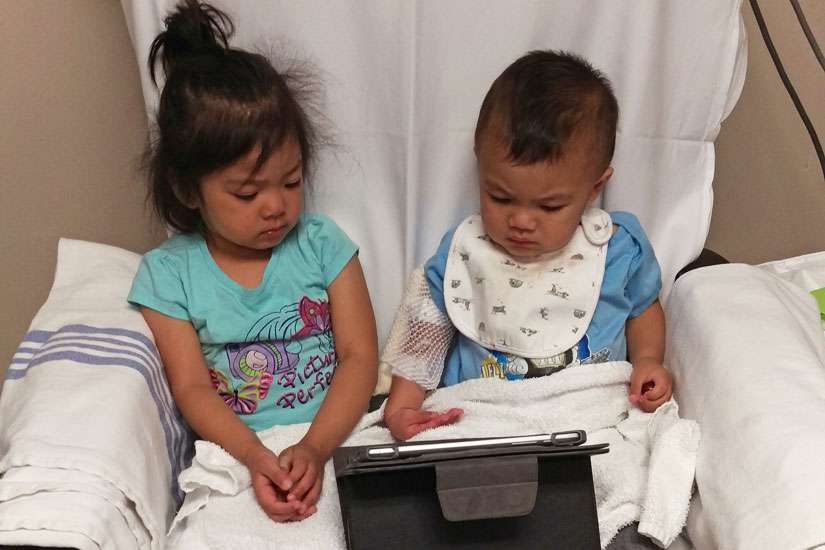Timothy was first diagnosed with alpha-thalassemia when his mother, Tracy Rafanan, was 20 weeks pregnant with him. It is a red blood cell disorder that impairs the production of hemoglobins and prevents efficient circulation of oxygen through his bloodstream to his organs. Rafanan and her husband Emil, parishioners at St. Francis Xavier parish in Mississauga, Ont., are genetic carriers of the disease.
“I had never heard the word thalassemia before that day,” said Rafanan. “It was hard for me because I could feel him moving... and when I learned he was sick, it just broke my heart. I can’t imagine a life where you would need all these blood transfusions.”
Every three weeks, even while he was still in his mother’s womb, Timothy received blood transfusions to give him healthy hemoglobins that will restore oxygen flow to his bloodstream. He will need this treatment all his life.
Rafanan said it is more than worth it to have the ball of energy Timothy is in their family’s life. Except for his regular hospital visits, he is just like any other kid.
“I think being in Canada, we’re so lucky to have these types of services,” she said. “I know in different countries, you have to bring your donor with you... But he will always have blood for him.”
Beth Frise, territory manager in Toronto for Canadian Blood Services, said it is cases like Timothy’s that put the most pressure on Canada’s blood supply system. When people donate blood, most assume the blood will go towards emergency operations. But most of the demand is for those who have regular treatments for chronic diseases.
“It is extremely important for Canadians to do their best to keep their blood donation appointments,” said Frise. “Canadian patients are depending on your generous donation.”
Frise estimates that they will need to collect 200,000 blood donations by July to support patient needs this summer.
The Archdiocese of Toronto recently signed to be a part of the Partners for Life program, promising to contribute 500 blood donations annually.
Frise said there are already several Catholic parishes and schools that contribute on a regular basis. St. Gabriel’s parish is a regular site, hosting blood clinics on the last Monday of every month.
“We have been doing this for more than 10 years, even in our old church premises,” said John Badali, office administrator at St. Gabriel’s. “It’s a very popular clinic and it’s a part of belonging to a community.”
Last year, the parish collected more that 860 units of blood. Since the average cancer patient uses five units during the course of their treatment, St. Gabriel’s collected enough blood to help 172 cancer patients.
One blood donation is about 450 ml of blood and it is often used within days of being donated, the demand is that urgent.
Frise estimates Canadian Blood Services will need about 100,000 new donors this year to maintain the national blood supply and to replace the aging donor base. About one in two Canadians is eligible to give blood, yet only four per cent of eligible donors sustain the blood system.
“Every minute of every day, someone in Canada needs blood and often from more than one generous donor,” said Frise.
Frise oversees three permanent blood clinics downtown and several mobile clinics throughout the city.
Rafanan does not need blood transfusions, but she cannot qualify to be a blood donor. Instead, she and her family are doing everything they can to raise awareness and encourage others.
“I just want people to know that it’s so important,” she said. “They say it’s in you to give and it really is. It’s something so small that would make a difference for a whole generation of family.”


